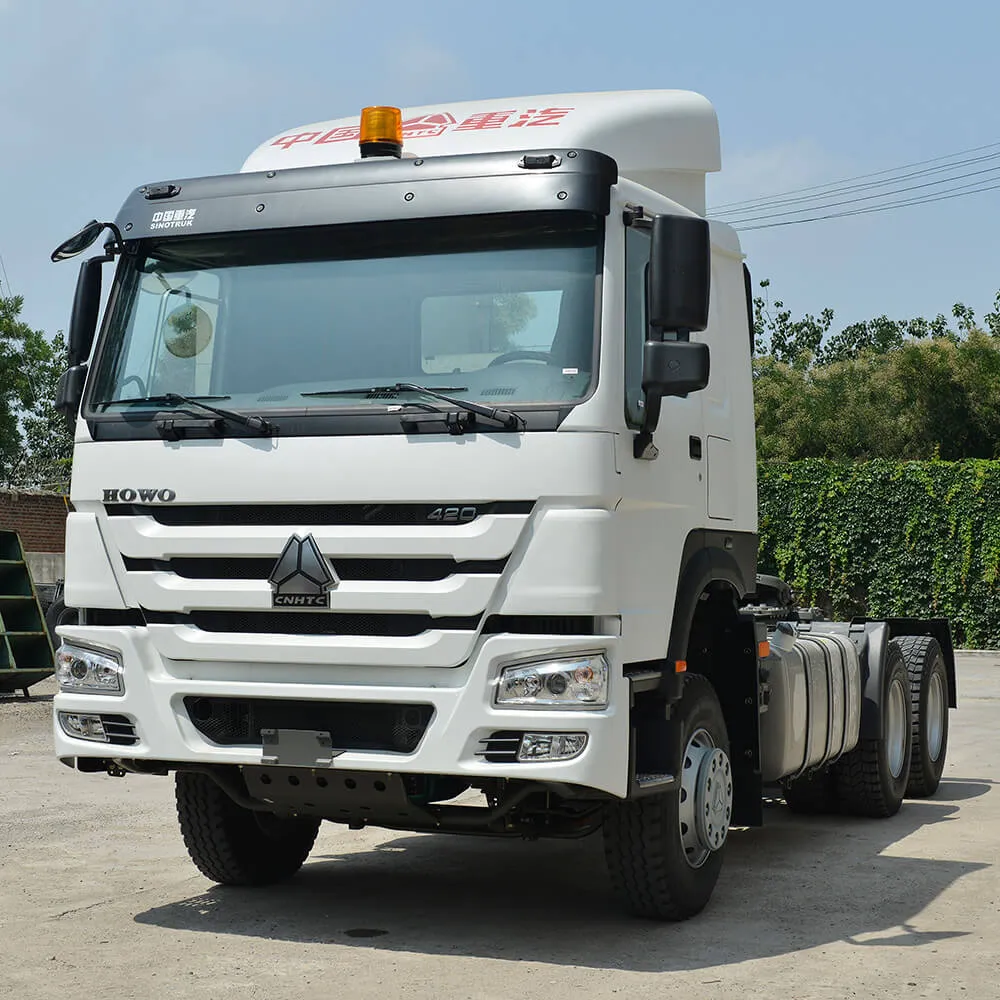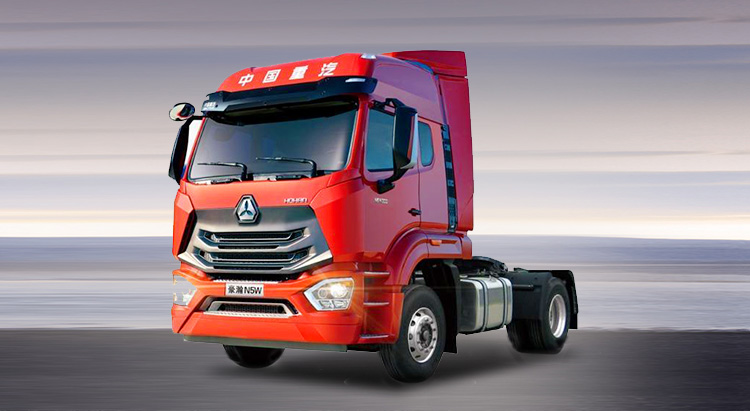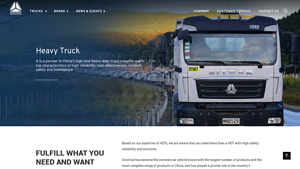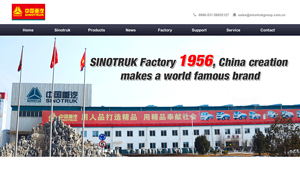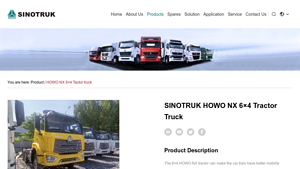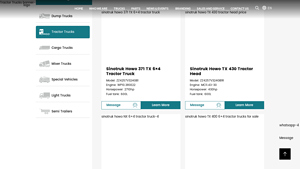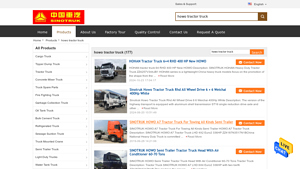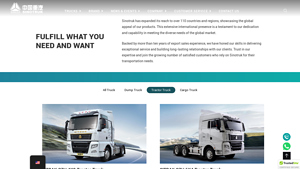Introduction: Navigating the Global Market for sinotruk Howo Tractor Truck
In the ever-evolving landscape of the global transportation industry, sourcing reliable and efficient heavy-duty vehicles, such as the Sinotruk Howo Tractor Truck, presents a significant challenge for international B2B buyers. With increasing demands for robust logistics solutions in regions like Africa, South America, the Middle East, and Europe, understanding the intricacies of these trucks becomes essential. This guide serves as a comprehensive resource, covering various types of Sinotruk Howo Tractor Trucks, their applications across different sectors, and critical factors for supplier vetting.
By delving into the specifications, performance capabilities, and cost considerations of the Howo range, buyers will gain the insights needed to make informed purchasing decisions. Whether you are in Nigeria seeking durable transport solutions or in Saudi Arabia looking for advanced logistics capabilities, this guide equips you with the knowledge to navigate the complexities of the market. Additionally, we will explore after-sales support and maintenance options that enhance the longevity and efficiency of your fleet. As the demand for cost-effective, high-performance trucks continues to rise, this guide empowers you to secure the best options available, ensuring your operations remain competitive and sustainable in today’s dynamic market.
Understanding sinotruk Howo Tractor Truck Types and Variations
| Type Name | Key Distinguishing Features | Primary B2B Applications | Brief Pros & Cons for Buyers |
|---|---|---|---|
| Howo TX 380 4×2 Tractor Truck | 380 HP engine, 4×2 drive system | Long-distance transport, logistics | Pros: Strong power for heavy loads; Cons: Limited off-road capability. |
| Howo TX 400 6×4 Tractor Truck | 400 HP engine, all-wheel drive, robust design | Container transport, bulk goods transport | Pros: High load capacity; Cons: Higher operational costs. |
| Howo NX 460 6×4 Tractor Truck | Ultra-high cost-performance ratio, comfortable | International logistics, freight transport | Pros: Exceptional comfort and reliability; Cons: May require more maintenance. |
| Howo TX 430 6×4 Tractor Truck | Adaptable for 60-70 ton trailers, versatile | Port operations, heavy-duty transport | Pros: Versatile for various loads; Cons: Requires skilled drivers for optimal use. |
| Howo TX 290 4×2 Cargo Truck | 290 HP engine, efficient fuel consumption | Urban logistics, light cargo transport | Pros: Cost-effective for city use; Cons: Limited power for heavy loads. |
What Are the Key Characteristics of the Howo TX 380 4×2 Tractor Truck?
The Howo TX 380 4×2 Tractor Truck is engineered for long-distance transportation, featuring a powerful 380 HP engine coupled with a 4×2 drive system. This model excels in logistics operations, particularly suited for transporting bulk goods over highways. B2B buyers should consider its strong power for heavy loads, though its limited off-road capability may restrict its use in rugged terrains.
How Does the Howo TX 400 6×4 Tractor Truck Stand Out?
With a robust 400 HP engine and an all-wheel drive system, the Howo TX 400 6×4 Tractor Truck is designed for high-load applications. Its versatility makes it an ideal choice for container and bulk goods transport. While it offers a high load capacity, buyers should be aware of the potentially higher operational costs associated with maintaining such a powerful vehicle.
Why Choose the Howo NX 460 6×4 Tractor Truck?
The Howo NX 460 6×4 Tractor Truck is known for its ultra-high cost-performance ratio, combining exceptional comfort with reliability. This model is particularly suited for international logistics and freight transport, providing a comfortable driving experience for long hauls. However, prospective buyers should factor in the maintenance requirements to ensure longevity and optimal performance.
What Makes the Howo TX 430 6×4 Tractor Truck Versatile?
The Howo TX 430 6×4 Tractor Truck is adaptable for transporting 60-70 ton semi-trailers, making it a versatile option for various heavy-duty applications, including port operations. Its capability to handle significant loads is a key advantage for B2B buyers. However, it requires skilled drivers to maximize its potential, which may impact operational costs.
How Is the Howo TX 290 4×2 Cargo Truck Ideal for Urban Logistics?
The Howo TX 290 4×2 Cargo Truck features a 290 HP engine and is designed for efficient fuel consumption, making it a cost-effective solution for urban logistics and light cargo transport. Its lower power output is suitable for city driving conditions, but buyers should consider its limitations for heavier loads, which may necessitate additional vehicles in their fleet.
Key Industrial Applications of sinotruk Howo Tractor Truck
| Industry/Sector | Specific Application of sinotruk Howo Tractor Truck | Value/Benefit for the Business | Key Sourcing Considerations for this Application |
|---|---|---|---|
| Construction | Transporting heavy machinery and materials | Enhances operational efficiency and reduces transport time | Evaluate load capacity and fuel efficiency for cost savings |
| Logistics and Freight Forwarding | Long-distance cargo transportation | Reliable delivery of goods, improving supply chain efficiency | Consider engine power and compatibility with various trailers |
| Agriculture | Hauling agricultural products | Streamlines the distribution process, reducing spoilage | Assess adaptability to different terrains and load types |
| Mining | Transportation of minerals and ores | Increases productivity by ensuring timely delivery | Focus on durability and maintenance support in harsh conditions |
| Oil and Gas | Movement of equipment and supplies | Ensures operational continuity and safety in remote areas | Check for specialized features for hazardous material transport |
How Is the Sinotruk Howo Tractor Truck Used in the Construction Industry?
In the construction sector, the sinotruk Howo Tractor Truck is pivotal for transporting heavy machinery, such as excavators and bulldozers, along with construction materials like concrete and steel. This capability significantly enhances operational efficiency, ensuring that projects remain on schedule. For buyers in regions like Africa or South America, where infrastructure development is booming, the truck’s robust design and high load capacity are crucial, allowing them to meet the demands of large-scale construction projects.
What Role Does the Sinotruk Howo Tractor Truck Play in Logistics and Freight Forwarding?
In logistics and freight forwarding, the sinotruk Howo Tractor Truck serves as a reliable vehicle for long-distance cargo transportation. With its powerful engine and compatibility with various trailer types, it can efficiently deliver goods across vast distances, thus improving supply chain efficiency. International buyers, especially in the Middle East, should consider factors such as engine power and fuel efficiency to maximize their operational cost-effectiveness.
How Does the Sinotruk Howo Tractor Truck Support Agricultural Operations?
The agricultural sector benefits from the sinotruk Howo Tractor Truck’s ability to haul various agricultural products, such as grains and livestock feed. This streamlines the distribution process, reducing spoilage and ensuring that products reach markets in a timely manner. For B2B buyers in Europe, understanding the truck’s adaptability to different terrains is essential, as agricultural operations often require transport across challenging landscapes.
In What Ways Does the Sinotruk Howo Tractor Truck Assist the Mining Industry?
In mining operations, the sinotruk Howo Tractor Truck is utilized for the transportation of minerals and ores from extraction sites to processing plants. Its durability and high load capacity significantly increase productivity by ensuring that materials are delivered on time. Buyers from regions rich in natural resources, such as Africa, should focus on the truck’s maintenance support and resilience in harsh working conditions to ensure long-term operational success.
How Is the Sinotruk Howo Tractor Truck Valuable in the Oil and Gas Sector?
For the oil and gas industry, the sinotruk Howo Tractor Truck is essential for moving equipment and supplies to remote locations. Its reliability ensures operational continuity, which is critical in an industry where downtime can lead to significant financial losses. Buyers in the Middle East and similar markets should verify the truck’s specialized features, particularly for transporting hazardous materials safely, to comply with industry regulations and ensure safety.
3 Common User Pain Points for ‘sinotruk Howo Tractor Truck’ & Their Solutions
Scenario 1: High Maintenance Costs Leading to Budget Overruns
The Problem: Many B2B buyers, particularly in emerging markets, experience escalating maintenance costs with their Sinotruk Howo Tractor Trucks. These costs can stem from a lack of readily available spare parts, leading to long downtimes and increased repair expenses. Additionally, if the trucks are not serviced according to the manufacturer’s recommendations, this can further compound repair issues, causing unexpected financial strain on logistics budgets.
The Solution: To effectively manage maintenance costs, B2B buyers should establish a proactive maintenance schedule that aligns with Sinotruk’s guidelines. This includes regular inspections, timely oil changes, and utilizing OEM parts to ensure compatibility and longevity. Buyers should also consider establishing a partnership with authorized service centers that can provide both maintenance and genuine parts. By negotiating maintenance contracts, companies can secure better pricing and ensure that their trucks are serviced by trained professionals familiar with Sinotruk products. Furthermore, joining a user community or forum can provide insights into common issues and solutions, enabling better preparation for maintenance needs.
Scenario 2: Difficulty in Finding Qualified Drivers Familiar with Heavy-Duty Trucks
The Problem: The logistics industry is often plagued by a shortage of qualified drivers, particularly those experienced in handling heavy-duty vehicles like the Sinotruk Howo Tractor Truck. In regions such as Africa and South America, this issue is exacerbated by varying levels of training and the need for drivers to adapt to different types of heavy machinery. As a result, companies may struggle with inefficiencies, increased accident rates, and compliance with safety regulations.
The Solution: To tackle the driver shortage, B2B buyers should invest in comprehensive training programs tailored to their fleet’s specific needs. Partnering with local driving schools that specialize in heavy-duty vehicle training can be beneficial. Additionally, offering incentives such as competitive wages, signing bonuses, or ongoing education can attract more qualified drivers. Establishing a mentorship program within the company can also help newer drivers gain hands-on experience under the guidance of seasoned professionals. This not only enhances safety but also ensures that drivers are well-versed in the unique features of Sinotruk trucks, leading to better operational efficiency.
Scenario 3: Challenges in Sourcing Reliable Financing Options
The Problem: International buyers of Sinotruk Howo Tractor Trucks often face significant challenges in securing financing for their purchases. Many banks and financial institutions may be hesitant to lend for heavy-duty trucks due to perceived risks, particularly in developing markets. This can lead to delays in acquiring the necessary equipment, ultimately affecting business operations and growth potential.
The Solution: To overcome financing hurdles, B2B buyers should explore multiple financing avenues, such as specialized lenders that focus on commercial vehicle financing. Engaging with Sinotruk’s financing partners or local banks that have experience with heavy-duty vehicle loans can provide tailored solutions that meet the buyer’s specific circumstances. Additionally, buyers should consider leveraging their existing relationships with suppliers for trade credit options or exploring government-backed programs designed to support logistics and transportation sectors. Preparing a solid business plan that outlines projected cash flow, potential revenue from truck operations, and repayment plans can also improve the chances of securing favorable financing terms. By being proactive and exploring various options, buyers can find a financial solution that supports their acquisition of Sinotruk Howo Tractor Trucks.
Strategic Material Selection Guide for sinotruk Howo Tractor Truck
What Are the Key Materials Used in Sinotruk Howo Tractor Trucks?
When selecting materials for the Sinotruk Howo Tractor Truck, it is crucial to consider properties that align with performance requirements and operational conditions. Below are analyses of four common materials used in these trucks, focusing on their properties, advantages, disadvantages, and implications for international B2B buyers.
Steel: The Backbone of Heavy-Duty Trucks
Key Properties: Steel is known for its high tensile strength, excellent ductility, and ability to withstand high temperatures and pressures. It exhibits good fatigue resistance, making it ideal for heavy-duty applications.
Pros & Cons: Steel is durable and cost-effective, making it a popular choice for structural components. However, it is prone to corrosion, which can be a significant drawback in humid or saline environments. Manufacturing complexity can vary based on the steel grade and treatment processes.
Impact on Application: Steel is compatible with various media, including oil and fuel, but care must be taken to prevent corrosion in high-moisture environments.
Considerations for International Buyers: Buyers from regions like Africa and the Middle East should ensure that the steel used complies with local standards (e.g., ASTM, DIN). Corrosion-resistant coatings may be necessary to enhance longevity in harsh climates.
Aluminum: Lightweight and Corrosion-Resistant
Key Properties: Aluminum is lightweight yet strong, with excellent corrosion resistance and thermal conductivity. It performs well in a wide range of temperatures.
Pros & Cons: The primary advantage of aluminum is its weight savings, which can improve fuel efficiency. However, it is generally more expensive than steel and can be less durable under extreme stress.
Impact on Application: Aluminum is suitable for components exposed to moisture, such as fuel tanks and body panels, due to its corrosion resistance.
Considerations for International Buyers: Buyers in Europe and South America may prefer aluminum for its lightweight properties, but they should be aware of the higher costs and ensure compliance with relevant material standards.
Composite Materials: Innovative Solutions for Performance
Key Properties: Composites, often made from a combination of materials like fiberglass and resin, offer high strength-to-weight ratios and excellent corrosion resistance.
Pros & Cons: Composites are highly durable and can be tailored for specific applications, making them versatile. However, they can be more expensive to manufacture and may require specialized knowledge for repairs.
Impact on Application: Composites are ideal for components that require lightweight and corrosion-resistant properties, such as interior panels and non-structural elements.
Considerations for International Buyers: Buyers should evaluate the availability of composite materials in their region and consider the potential need for specialized maintenance and repair services.
Rubber: Essential for Sealing and Vibration Damping
Key Properties: Rubber is known for its elasticity, resilience, and ability to withstand a range of temperatures and pressures. It also provides excellent vibration damping.
Pros & Cons: Rubber is cost-effective and provides effective sealing solutions, but it may degrade over time when exposed to UV light and extreme temperatures.
Impact on Application: Rubber is commonly used in gaskets, seals, and hoses, ensuring compatibility with various fluids and enhancing the overall performance of the truck.
Considerations for International Buyers: Buyers should ensure that rubber components meet local standards for durability and performance, particularly in regions with extreme weather conditions.
Summary Table of Material Selection for Sinotruk Howo Tractor Trucks
| Material | Typical Use Case for Sinotruk Howo Tractor Truck | Key Advantage | Key Disadvantage/Limitation | Relative Cost (Low/Med/High) |
|---|---|---|---|---|
| Steel | Structural components, chassis | High strength and cost-effectiveness | Prone to corrosion | Low |
| Aluminum | Fuel tanks, body panels | Lightweight and corrosion-resistant | Higher cost and lower durability | High |
| Composite | Interior panels, non-structural elements | High strength-to-weight ratio | Expensive and requires specialized repair | Medium |
| Rubber | Gaskets, seals, hoses | Effective sealing and vibration damping | Degrades with UV exposure | Low |
This guide provides a comprehensive overview of the strategic material selection for Sinotruk Howo Tractor Trucks, offering valuable insights for international B2B buyers in diverse markets. Understanding these materials will help in making informed purchasing decisions that align with operational needs and regional standards.
In-depth Look: Manufacturing Processes and Quality Assurance for sinotruk Howo Tractor Truck
What Are the Main Stages of the Manufacturing Process for Sinotruk Howo Tractor Trucks?
The manufacturing process of Sinotruk Howo Tractor Trucks involves several critical stages designed to ensure quality, durability, and performance. The key stages include material preparation, forming, assembly, and finishing.
How is Material Prepared for Sinotruk Howo Tractor Trucks?
The first step in the manufacturing process is material preparation, which involves sourcing high-quality raw materials such as steel, aluminum, and composites. Sinotruk emphasizes using advanced materials that meet international standards for strength and durability. This stage includes rigorous inspections to ensure that all materials meet specifications before they proceed to the next stage.
What Techniques Are Used in Forming Components?
Once the materials are prepared, they undergo various forming processes. These include cutting, bending, welding, and casting to create the individual components of the truck. Advanced techniques such as laser cutting and robotic welding are employed to enhance precision and reduce human error. This ensures that each part fits perfectly, which is crucial for the overall performance of the vehicle.
How Does the Assembly Process Work?
The assembly stage is where the individual components come together to form the complete tractor truck. This process is typically carried out in a systematic manner, with dedicated assembly lines for different models. Skilled technicians assemble the chassis, engine, transmission, and other critical systems while following standardized procedures to maintain consistency. Each assembly line is equipped with tools and equipment that meet safety and efficiency standards, further enhancing productivity.
What Finishing Techniques Are Employed?
Finishing involves several processes to enhance the truck’s appearance and protect it from environmental factors. This includes painting, coating, and applying decals. Sinotruk uses advanced finishing techniques that not only provide aesthetic appeal but also ensure long-lasting protection against corrosion and wear. Quality control checks are integrated into this stage to verify that the finishing meets the required standards.
How Does Quality Assurance Work in the Manufacturing of Sinotruk Howo Tractor Trucks?
Quality assurance (QA) is integral to the manufacturing of Sinotruk Howo Tractor Trucks. The company adheres to several international standards, including ISO 9001, which outlines requirements for a quality management system. Compliance with these standards ensures that products consistently meet customer and regulatory requirements.
What International Standards Are Relevant for Quality Assurance?
In addition to ISO 9001, Sinotruk also complies with other relevant international standards, such as CE certification for safety and environmental protection, and API standards for engine components. These certifications not only enhance the credibility of the product but also assure international B2B buyers that the trucks meet rigorous quality and safety criteria.
What Are the Key Quality Control Checkpoints?
Quality control checkpoints are strategically integrated throughout the manufacturing process. These include:
- Incoming Quality Control (IQC): This checkpoint verifies the quality of raw materials upon arrival at the facility.
- In-Process Quality Control (IPQC): This stage involves monitoring the manufacturing process to ensure that components are produced according to specifications.
- Final Quality Control (FQC): Once the trucks are assembled, they undergo comprehensive testing to ensure that they meet performance and safety standards.
Each checkpoint involves a series of tests and inspections, which may include visual inspections, dimensional checks, and functional tests.
What Common Testing Methods Are Used for Quality Assurance?
Several common testing methods are utilized to ensure the quality of Sinotruk Howo Tractor Trucks. These include:
- Performance Testing: Evaluating the truck’s performance under various conditions, such as load capacity and fuel efficiency.
- Durability Testing: Subjecting the trucks to extreme conditions to test their endurance and reliability.
- Safety Testing: Ensuring that all safety features, such as braking systems and stability controls, function correctly.
These tests provide essential data that help in refining the manufacturing processes and improving product quality.
How Can B2B Buyers Verify Supplier Quality Control?
For international B2B buyers, particularly those from regions like Africa, South America, the Middle East, and Europe, verifying the quality control processes of suppliers is crucial. Here are several ways buyers can ensure supplier integrity:
What Steps Can Buyers Take for Supplier Audits?
Conducting supplier audits is one of the most effective ways to verify quality control practices. Buyers can request to visit the manufacturing facility to observe the production processes, quality control checkpoints, and testing methods firsthand. During these audits, buyers can assess compliance with international standards and the overall manufacturing environment.
How Can Buyers Request Quality Reports?
B2B buyers should also request quality reports and certifications from suppliers. These documents should detail the quality management systems in place, results from various tests, and compliance with international standards. Reviewing these reports allows buyers to make informed decisions based on the supplier’s track record.
What Role Do Third-Party Inspections Play?
Engaging third-party inspection services can provide an additional layer of assurance. These independent organizations can conduct thorough inspections and testing to verify that the trucks meet the required specifications before shipment. This is particularly important for buyers in regions where local regulations may differ significantly from international standards.
What Are the Quality Control Nuances for International B2B Buyers?
For international buyers, understanding the nuances of quality control is essential. Differences in regulations and standards can impact the quality of products delivered. Buyers should familiarize themselves with the specific requirements of their home markets and communicate these to suppliers. Additionally, it is advisable to establish clear contracts that outline quality expectations and penalties for non-compliance.
In conclusion, the manufacturing and quality assurance processes for Sinotruk Howo Tractor Trucks are designed to meet high standards of reliability and performance. By understanding these processes and implementing thorough verification methods, international B2B buyers can ensure they receive products that align with their operational needs and compliance requirements.
Practical Sourcing Guide: A Step-by-Step Checklist for ‘sinotruk Howo Tractor Truck’
Introduction
This sourcing guide is designed to assist B2B buyers in navigating the procurement process for Sinotruk Howo Tractor Trucks. With a focus on reliability, cost-effectiveness, and performance, this checklist outlines key steps to ensure a successful purchase that meets your operational needs.
Step 1: Define Your Technical Specifications
Establishing clear technical specifications is crucial for aligning your needs with the capabilities of the Sinotruk Howo Tractor Truck. Consider factors such as engine power (e.g., 340HP, 400HP), drivetrain configuration (e.g., 4×2, 6×4), and load capacity. Clearly defined requirements will facilitate communication with suppliers and help you evaluate which model best suits your operational demands.
Step 2: Research Potential Suppliers
Conduct thorough research to identify reputable suppliers of Sinotruk Howo Tractor Trucks. Look for established companies with a history of successful transactions in your region. Focus on suppliers who provide comprehensive product support and have a strong presence in the markets you operate in, such as Africa, South America, or the Middle East.
Step 3: Evaluate Supplier Certifications
Before finalizing a supplier, verify their certifications and compliance with international standards. Certifications like ISO 9001 or equivalent signify a commitment to quality management. Additionally, check for any regional certifications that may be relevant to your country’s import regulations, ensuring the trucks meet local safety and environmental standards.
Step 4: Request Detailed Quotations
Once you have shortlisted potential suppliers, request detailed quotations that outline pricing, payment terms, and delivery timelines. Ensure that the quotes include all necessary components, such as warranties, after-sales support, and maintenance packages. A transparent quotation process helps in comparing offers and understanding the total cost of ownership.
Step 5: Inspect Product Quality
Where possible, arrange for an inspection of the trucks or request product samples. This step is vital to assess the quality and performance of the vehicles firsthand. Pay attention to construction quality, material durability, and any technological features that enhance operational efficiency. Engaging third-party inspection services can also provide unbiased evaluations.
Step 6: Assess After-Sales Support
Evaluate the after-sales support offered by the supplier, including maintenance services, spare parts availability, and technical assistance. A supplier that provides robust after-sales support can significantly reduce downtime and operational disruptions. Look for suppliers who have established service networks in your region for easier access to support.
Step 7: Finalize Terms and Place Order
Once you have selected a supplier and are satisfied with their offerings, finalize the purchase terms. Ensure that all agreements are documented, including warranty details, service agreements, and delivery schedules. Placing the order with clear contractual terms will protect your interests and ensure a smooth procurement process.
By following this checklist, you can streamline your sourcing process for Sinotruk Howo Tractor Trucks, ensuring that you make informed decisions that align with your business objectives.
Comprehensive Cost and Pricing Analysis for sinotruk Howo Tractor Truck Sourcing
What Are the Key Cost Components in Sinotruk Howo Tractor Truck Sourcing?
When evaluating the cost structure of Sinotruk Howo Tractor Trucks, several core components come into play. These include materials, labor, manufacturing overhead, tooling, quality control (QC), logistics, and profit margin.
-
Materials: The primary materials involved in truck manufacturing include high-strength steel, aluminum, and various composites. The choice of materials directly impacts durability and performance, influencing both the initial cost and long-term operational efficiency.
-
Labor: Labor costs vary by region and are influenced by the level of expertise required for assembly and quality assurance. In China, where Sinotruk is based, labor costs are typically lower compared to Europe or North America, providing a competitive advantage in pricing.
-
Manufacturing Overhead: This encompasses costs related to factory operations, utilities, and equipment depreciation. Sinotruk’s investment in intelligent manufacturing processes helps optimize efficiency, which can translate into cost savings.
-
Tooling: Specialized tools and equipment for manufacturing can represent a significant upfront investment. However, the scalability of operations often justifies these costs, especially when producing in high volumes.
-
Quality Control (QC): Ensuring product reliability and compliance with international standards incurs costs associated with testing and certification. The robust QC processes at Sinotruk help maintain a reputation for high-quality vehicles, which is crucial for international markets.
-
Logistics: Shipping costs are significant, particularly for international buyers. Factors such as distance, mode of transportation, and local regulations can all affect logistics expenses.
-
Margin: Finally, the profit margin varies based on the competitive landscape and buyer negotiations. Sinotruk aims to balance competitive pricing with sustainable profit levels.
How Do Price Influencers Affect the Cost of Sinotruk Howo Tractor Trucks?
Several factors influence the pricing of Sinotruk Howo Tractor Trucks, particularly for international buyers:
-
Volume/MOQ: Pricing often benefits from economies of scale. Higher order volumes can lead to lower per-unit costs, which is an essential consideration for bulk buyers.
-
Specifications and Customization: Buyers requiring specific configurations or enhancements may face higher costs. Customization can involve additional materials and labor, impacting the overall price.
-
Materials and Quality Certifications: The choice of materials and adherence to international quality certifications can significantly influence pricing. Trucks built with premium materials and recognized certifications typically command higher prices but offer better longevity and performance.
-
Supplier Factors: The reliability and reputation of the supplier can also impact pricing. Established suppliers like Sinotruk may offer more favorable terms due to their strong market position and production capacity.
-
Incoterms: The agreed-upon shipping terms (Incoterms) determine who bears the costs and risks during transportation. Understanding these terms is crucial for accurate cost estimation.
What Buyer Tips Can Help Optimize Costs in Sinotruk Howo Tractor Truck Sourcing?
For B2B buyers, particularly from Africa, South America, the Middle East, and Europe, optimizing costs in sourcing Sinotruk Howo Tractor Trucks involves several strategic approaches:
-
Negotiation: Leverage competitive quotes from multiple suppliers to negotiate better terms. Understanding the cost structure can provide leverage during discussions.
-
Focus on Total Cost of Ownership (TCO): Consider not just the purchase price but also long-term costs such as maintenance, fuel efficiency, and resale value. A higher initial investment may yield lower operational costs over time.
-
Understand Pricing Nuances: Be aware of the various factors that influence pricing and communicate specific requirements clearly to avoid unexpected costs. This includes discussing specifications, customizations, and logistics in detail.
-
Evaluate Incoterms: Clearly define shipping terms to avoid hidden costs. Familiarize yourself with common Incoterms to ensure you understand your responsibilities and risks.
-
Consider Market Trends: Stay informed about market trends and fluctuations in material costs, which can impact overall pricing. This knowledge can aid in timing purchases for optimal pricing.
Disclaimer on Indicative Prices
Pricing for Sinotruk Howo Tractor Trucks can vary widely based on specifications, order volume, and market conditions. Therefore, it is crucial for buyers to conduct thorough research and obtain updated quotes to make informed purchasing decisions.
Alternatives Analysis: Comparing sinotruk Howo Tractor Truck With Other Solutions
Exploring Alternatives to the Sinotruk Howo Tractor Truck
In the competitive landscape of heavy-duty transportation, the Sinotruk Howo Tractor Truck stands out for its reliability and cost-effectiveness. However, various alternatives also serve the needs of international B2B buyers, particularly in regions like Africa, South America, the Middle East, and Europe. Understanding these options can help businesses make informed decisions tailored to their operational requirements.
| Comparison Aspect | Sinotruk Howo Tractor Truck | Volvo FH Series | Scania R Series |
|---|---|---|---|
| Performance | 400 HP, robust design for heavy loads | Up to 750 HP, fuel-efficient | Up to 770 HP, high torque |
| Cost | Competitive pricing | Higher initial investment | Premium pricing |
| Ease of Implementation | Standardized setup, easy to source parts | Complex configurations, requires specialized training | Requires specialized training for optimal use |
| Maintenance | Relatively low maintenance costs, good availability of parts | Higher maintenance costs due to premium components | Moderate costs, parts availability varies by region |
| Best Use Case | Ideal for construction and logistics | Long-distance transport, fuel efficiency | Heavy haulage, high-performance applications |
What Are the Advantages and Disadvantages of the Volvo FH Series?
The Volvo FH Series is known for its high-performance engines that can reach up to 750 HP, providing excellent fuel efficiency, especially for long-distance transportation. The advanced safety features and driver comfort make it a preferred choice among drivers. However, the higher initial investment and more complex maintenance requirements can be a drawback for businesses operating on tighter budgets. Additionally, the need for specialized training to operate the vehicle efficiently may add to overall costs.
How Does the Scania R Series Compare?
The Scania R Series is designed for heavy haulage, with a maximum output of 770 HP and exceptional torque. This makes it a strong contender for businesses that require high performance in challenging conditions. The truck’s advanced aerodynamics contribute to fuel savings, enhancing its cost-effectiveness over time. However, like the Volvo, the Scania R Series comes with a premium price tag and might involve higher maintenance costs, particularly in regions where parts are less accessible. Additionally, the complexity of the vehicle may require specialized training for operators.
How Can B2B Buyers Choose the Right Solution for Their Needs?
When selecting a tractor truck, B2B buyers should consider several factors, including performance requirements, budget constraints, and operational needs. The Sinotruk Howo Tractor Truck offers a compelling combination of reliability and cost-effectiveness, making it suitable for various applications, particularly in construction and logistics. In contrast, alternatives like the Volvo FH and Scania R Series excel in long-distance transport and heavy-duty applications but come at a higher price and maintenance cost. Ultimately, understanding the specific use case and aligning it with the strengths of each option will guide buyers in making the best choice for their operations.
Essential Technical Properties and Trade Terminology for sinotruk Howo Tractor Truck
What Are the Key Technical Properties of Sinotruk Howo Tractor Trucks?
Understanding the technical properties of Sinotruk Howo Tractor Trucks is crucial for B2B buyers looking to invest in reliable heavy-duty vehicles. Here are some essential specifications to consider:
-
Horsepower (HP): The horsepower of a tractor truck directly influences its performance and suitability for different types of cargo and terrains. For instance, the Howo TX 400 has a powerful 400 HP engine, making it ideal for heavy loads and challenging conditions. Higher horsepower typically means better acceleration and climbing ability, which is essential for businesses operating in mountainous or uneven landscapes.
-
Drive Configuration: The drive configuration (e.g., 4×2, 6×4, 8×4) affects the truck’s traction, stability, and load capacity. A 6×4 configuration, like that of the Howo TX 430, offers a balance of power and stability, making it suitable for long-distance transportation and heavy loads. Understanding the drive system is vital for selecting a truck that meets specific operational needs.
-
Load Capacity: The load capacity, often expressed in tons, indicates how much weight a truck can safely transport. Sinotruk Howo Tractor Trucks can typically handle 60-70 tons when paired with the right semi-trailer. This specification is critical for logistics companies and freight carriers as it directly impacts operational efficiency and cost management.
-
Fuel Efficiency: Fuel efficiency is a key consideration for any logistics operation. The Howo series trucks are designed to provide excellent fuel economy, which helps reduce operating costs over time. A truck that consumes less fuel while delivering high performance can significantly enhance profitability for fleet operators.
-
Safety Features: Safety is paramount in heavy-duty trucking. Sinotruk Howo Tractor Trucks are equipped with advanced safety systems such as anti-lock braking systems (ABS) and electronic stability control (ESC). These features help prevent accidents and ensure the safety of both the driver and cargo, making them a reliable choice for international transport.
What Common Trade Terms Should B2B Buyers Know When Purchasing Sinotruk Howo Tractor Trucks?
Familiarizing yourself with industry jargon is vital for effective communication and negotiation in the B2B landscape. Here are some common trade terms relevant to purchasing Sinotruk Howo Tractor Trucks:
-
OEM (Original Equipment Manufacturer): This term refers to companies that produce parts and equipment that may be marketed by another manufacturer. When purchasing from Sinotruk, understanding OEM parts ensures that you are sourcing high-quality components that meet the manufacturer’s specifications, which is critical for vehicle longevity and performance.
-
MOQ (Minimum Order Quantity): MOQ is the smallest number of units a supplier is willing to sell. Knowing the MOQ for Sinotruk Howo Tractor Trucks helps buyers plan their budgets and inventory effectively. For larger enterprises, negotiating lower MOQs can lead to significant cost savings.
-
RFQ (Request for Quotation): An RFQ is a standard business process where a buyer requests price quotes from suppliers for specific products. When looking to purchase Howo trucks, submitting an RFQ to Sinotruk or authorized dealers can provide clarity on pricing, availability, and delivery timelines.
-
Incoterms (International Commercial Terms): These are predefined commercial terms published by the International Chamber of Commerce that delineate the responsibilities of buyers and sellers in international transactions. Understanding Incoterms is crucial for B2B buyers to clarify shipping responsibilities, risk management, and cost allocation when importing Howo trucks.
-
Lead Time: Lead time refers to the amount of time between placing an order and receiving the product. In the context of purchasing Sinotruk Howo Tractor Trucks, knowing the lead time can help businesses plan their logistics and operations efficiently, minimizing downtime.
By familiarizing yourself with these technical specifications and industry terms, you can make informed decisions when investing in Sinotruk Howo Tractor Trucks, ensuring that your business meets its operational needs effectively.
Navigating Market Dynamics and Sourcing Trends in the sinotruk Howo Tractor Truck Sector
What Are the Key Market Drivers and Trends in the Sinotruk Howo Tractor Truck Sector?
The Sinotruk Howo Tractor Truck sector is experiencing robust growth, driven by several global market dynamics. First, there is an increasing demand for heavy-duty trucks in developing regions like Africa, South America, and the Middle East, where infrastructure projects and urbanization are on the rise. Governments are investing in transportation networks, which bolsters demand for reliable and efficient logistics solutions. Additionally, the trend towards digitalization in the trucking industry—such as telematics and fleet management systems—enables businesses to optimize operations, reduce costs, and improve service delivery.
Furthermore, the shift towards electric and hybrid vehicles is gaining traction, although traditional diesel-powered trucks still dominate the market due to their established reliability and performance. This presents opportunities for Sinotruk, which is expanding its product line to include new energy vehicles that meet evolving customer needs while addressing environmental concerns. The overall B2B landscape is marked by heightened competition, necessitating that buyers carefully evaluate suppliers based on product quality, after-sales support, and technological advancements.
How Can Sustainability and Ethical Sourcing Impact Your Sourcing Decisions for Sinotruk Howo Tractor Trucks?
Sustainability is becoming a crucial factor in procurement decisions, especially for international B2B buyers. The environmental impact of heavy-duty trucks is significant, prompting companies to consider the carbon footprint of their fleet. Sinotruk is actively working to enhance the sustainability of its products through better fuel efficiency, reduced emissions, and the introduction of new energy vehicles. Buyers should look for certifications that indicate compliance with environmental standards, as these can significantly influence brand reputation and customer loyalty.
Moreover, ethical sourcing practices are essential in today’s global marketplace. Ensuring that suppliers adhere to labor standards and environmental regulations not only mitigates risks but also aligns with corporate social responsibility goals. Sinotruk’s commitment to social responsibility and ethical manufacturing can serve as a competitive advantage, appealing to buyers who prioritize sustainable and ethical practices in their supply chains. By partnering with manufacturers that prioritize these values, businesses can enhance their own sustainability credentials and contribute to a more responsible industry.
How Has Sinotruk Evolved Over the Years to Meet Global Market Needs?
Founded in 1956, Sinotruk has a rich history as China’s first heavy-duty truck manufacturer. Initially producing the country’s first heavy-duty truck in 1960, the company has undergone significant transformations to adapt to changing market dynamics and technological advancements. Following its restructuring in 2001, Sinotruk established itself as a leader in R&D and manufacturing of heavy-duty trucks, including the popular Howo series.
The company has consistently focused on innovation, reliability, and cost-effectiveness, positioning itself as a key player in the global market. With a robust export strategy, Sinotruk has successfully penetrated diverse markets, including Africa, the Middle East, and South America, establishing itself as a trusted partner for businesses seeking reliable heavy-duty transportation solutions. This evolution underscores Sinotruk’s commitment to meeting the diverse needs of international B2B buyers while contributing to infrastructure development worldwide.
Frequently Asked Questions (FAQs) for B2B Buyers of sinotruk Howo Tractor Truck
-
How do I address potential issues with the Sinotruk Howo Tractor Truck during operation?
To address operational issues with the Sinotruk Howo Tractor Truck, first ensure regular maintenance according to the manufacturer’s guidelines. Common problems may include engine performance, transmission issues, or electrical malfunctions. Establish a relationship with a reliable local service provider for quick repairs. Additionally, training your operators on the truck’s features and troubleshooting basic issues can mitigate downtime. Utilize Sinotruk’s after-sales service for technical support and parts replacement, ensuring your fleet remains operational. -
What are the key specifications to consider when choosing a Sinotruk Howo Tractor Truck?
When selecting a Sinotruk Howo Tractor Truck, consider engine power (measured in horsepower), transmission type, and fuel efficiency. Evaluate load capacity to ensure it meets your logistics needs, especially for heavy loads typical in construction or mining. Look for features that enhance comfort and safety, such as cabin ergonomics and braking systems. Finally, ensure the truck is compatible with the types of trailers you plan to use, as this impacts overall performance. -
What customization options are available for Sinotruk Howo Tractor Trucks?
Sinotruk offers various customization options for their Howo Tractor Trucks, including engine upgrades, cabin modifications, and additional safety features. Depending on your operational needs, you can request specialized attachments or equipment tailored for specific industries such as agriculture or construction. It’s advisable to discuss your requirements with a Sinotruk representative to explore all available options and ensure compliance with local regulations. -
What is the minimum order quantity (MOQ) for purchasing Sinotruk Howo Tractor Trucks?
The minimum order quantity for Sinotruk Howo Tractor Trucks can vary based on your location and the specific model. Typically, larger orders may qualify for better pricing and terms. It’s important to communicate your needs directly with Sinotruk or an authorized dealer to understand their MOQ policies and any potential discounts available for bulk purchases. This can also streamline logistics and shipping processes. -
What payment terms can I expect when sourcing Sinotruk Howo Tractor Trucks?
Payment terms for purchasing Sinotruk Howo Tractor Trucks generally include options such as upfront payment, letters of credit, or installment plans. The specific terms can depend on the buyer’s creditworthiness, order size, and the supplier’s policies. To facilitate smoother transactions, negotiate payment terms early in the discussion process and ensure all agreements are documented in the purchase contract. -
How can I vet suppliers when sourcing Sinotruk Howo Tractor Trucks internationally?
To vet suppliers for Sinotruk Howo Tractor Trucks, conduct thorough research to assess their credibility and track record. Look for customer testimonials, industry certifications, and their experience with international trade. Request references from other buyers, and check for any complaints or issues raised against them. Additionally, consider visiting the supplier’s facility if feasible, or using third-party inspection services to ensure product quality before committing to a purchase. -
What logistics considerations should I keep in mind when importing Sinotruk Howo Tractor Trucks?
When importing Sinotruk Howo Tractor Trucks, consider shipping methods, customs regulations, and potential tariffs in your country. Work with a logistics provider experienced in heavy machinery transport to navigate these complexities. Ensure that all necessary documentation, including import permits and compliance certificates, is in order to avoid delays. Planning for storage and distribution upon arrival is also crucial for efficient supply chain management. -
What quality assurance measures should I expect from Sinotruk Howo Tractor Truck suppliers?
Reputable suppliers of Sinotruk Howo Tractor Trucks should have robust quality assurance measures in place, including rigorous testing of each vehicle before shipment. Expect documentation that outlines the quality control processes, warranties, and service agreements. Regular audits of manufacturing facilities and adherence to international quality standards, such as ISO certification, are also indicators of a supplier’s commitment to quality. Always clarify these aspects in your initial discussions to ensure peace of mind regarding your investment.
Important Disclaimer & Terms of Use
⚠️ Important Disclaimer
The information provided in this guide, including content regarding manufacturers, technical specifications, and market analysis, is for informational and educational purposes only. It does not constitute professional procurement advice, financial advice, or legal advice.
While we have made every effort to ensure the accuracy and timeliness of the information, we are not responsible for any errors, omissions, or outdated information. Market conditions, company details, and technical standards are subject to change.
B2B buyers must conduct their own independent and thorough due diligence before making any purchasing decisions. This includes contacting suppliers directly, verifying certifications, requesting samples, and seeking professional consultation. The risk of relying on any information in this guide is borne solely by the reader.
Top 6 Sinotruk Howo Tractor Truck Manufacturers & Suppliers List
1. SINOTRUK – Heavy Duty Trucks
Domain: howo-truck.com
Registered: 2009 (16 years)
Introduction: Heavy Truck – SINOTRUK Trucks
– Characteristics: High reliability, cost-effectiveness, comfort, safety, intelligence.
– Product Range: Heavy-duty trucks including Dump Trucks, Tractor Trucks, Cargo Trucks, Light Trucks, Tipper Trucks, Special Vehicles, Water Tankers, Oil Tankers, Mixer Trucks, and more.
– Key Models:
– Howo TX 400 8×8 Dump Truck: Excels in performance and application versatility…
2. SINOTRUK – Heavy-Duty Trucks
Domain: sinotrukgroup.com.cn
Registered: 2016 (9 years)
Introduction: SINOTRUK offers a wide range of heavy-duty trucks including:
– Dump Trucks: HOWO 380HP Dump Truck, HOWO 6X4 Dump Truck, HOWO 8X4 Dump Truck, HOWO 6X4 Tipper Truck
– Tractor Trucks: HOWO Tractor Truck 400HP, HOWO Tractor Truck 430HP, HOWO 6X4 Tractor Truck, HOWO T7H 6X4 Tractor Truck
– Cargo Trucks: HOWO Cargo Truck, HOWO Stake Cargo Truck, HOWO Cargo Truck Chassis, HOWO Flatbed Cargo Truck, HOW…
3. SINOTRUK – HOWO NX 6×4 Tractor Truck
Domain: sinotruckinternational.com
Registered: 2017 (8 years)
Introduction: SINOTRUK HOWO NX 6×4 Tractor Truck
– Model: ZZ4257V344JB1
– Made Year: Brand New, 2025
– Cabin: H77L cabin, with A/C
– Engine: WP12.400E201, 400hp, Euro II emission
– Gearbox: HW19712 transmission + HW70 flange type force extractor
– Front axle: VGD95 Front axle (drum)
– Rear axle: MCX16ZG Double Rear axle (drum)
– Fuel tank: 600L
– Tire: 12.00R20 tires (mixed pattern /18PR), 11 pcs (including one…
4. Sinotruk – Heavy-Duty Trucks
Domain: sinotruk-howo.com
Registered: 2013 (12 years)
Introduction: [{‘model’: ‘ZZ4257V324GB1’, ‘engine’: ‘WP10.380E22’, ‘horsepower’: ‘2710hp’, ‘fuel_tank’: ‘600L’}, {‘model’: ‘ZZ4257V324GB1R’, ‘engine’: ‘MC11.43-30’, ‘horsepower’: ‘430hp’, ‘fuel_tank’: ‘600L’}, {‘model’: ‘ZZ3257V364JB1’, ‘power’: ‘400hp’, ‘engine’: ‘WP10.380E22’, ‘max_horsepower’: ‘371’}, {‘model’: ‘ZZ4257V324GF1’, ‘engine’: ‘Weichai WP10.5H430E62’, ‘horsepower’: ‘400hp’, ‘fuel_tank’: ‘750L’}, {…
5. SINOTRUK – HOWO Tractor Truck Models
Domain: sinotruk-international.com
Registered: 2015 (10 years)
Introduction: SINOTRUK HOWO Tractor Truck models include: 1. HOHAN Tractor Truck 6×4 RHD 400 HP 2. HOWO A7 Tractor Truck LHD 4X2 Euro2 336HP 3. HOWO A7 LHD 6X4 Euro2 336HP with two berth 4. HOWO T5G MAN Engine Tractor Truck LHD 6X4 Euro4 336HP 5. HOWO T7H MAN Engine Tractor Truck 6X4 Euro 3 / 4 440 HP 6. HOWO Tow Tractor Truck RHD 10 Wheels 371HP 7. HOWO RHD 4X2 Euro2 290HP. Features include: heavy-duty design,…
6. CNHTC Group – Howo Tractor Head Truck
Domain: cnhtcgroup.com
Registered: 2024 (1 years)
Introduction: Howo Tractor Head Truck – Sinotruk Trucks Heavy Truck Dump Truck Tractor Truck Cargo Truck Light Truck Cargo Truck Tipper Truck Special Vehicle Water Tanker Oil Tanker Mixer Truck Other Truck Light Vehicle Pickup SUV Semi Trailer Semi Trailer New Energy Vehicle Brand Strategy Intelligent Manufacturing. Key Models: SITRAK C7H 4X2 Tractor Truck, SITRAK C7H 6X4 Tractor Truck, HOWO Tractor Truck 266-4…
Strategic Sourcing Conclusion and Outlook for sinotruk Howo Tractor Truck
In navigating the complex landscape of heavy-duty transportation, the Sinotruk Howo Tractor Truck stands out as a formidable choice for international buyers. With its renowned reliability, cost-effectiveness, and adaptability to diverse operational environments, this vehicle is designed to meet the rigorous demands of logistics and construction industries across Africa, South America, the Middle East, and Europe.
Strategic sourcing is crucial in ensuring that businesses acquire not just a truck, but a comprehensive solution that enhances operational efficiency and reduces total cost of ownership. By leveraging Sinotruk’s extensive range of models, including options tailored for long-haul and heavy-duty applications, buyers can align their procurement strategies with their specific logistical needs.
Looking ahead, the growing infrastructure projects and increasing trade activities in emerging markets present a unique opportunity for businesses to capitalize on the capabilities of Sinotruk Howo Tractor Trucks. We encourage international buyers to explore this opportunity and partner with Sinotruk to secure a reliable fleet that will propel their operations into the future. Engage with Sinotruk today to discover tailored solutions that drive success in your transportation endeavors.

